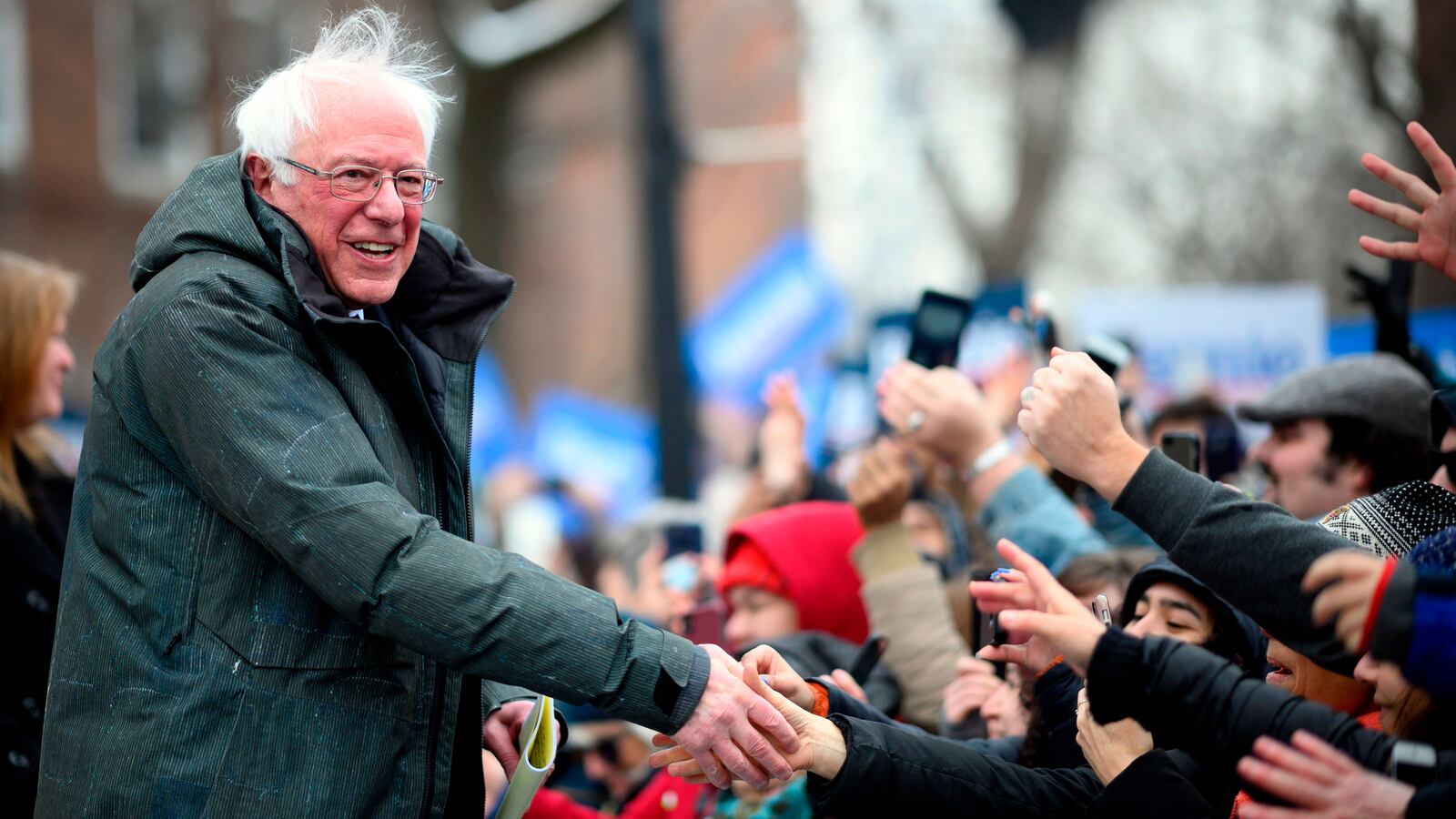NEW YORK—With the launch of his second campaign for the presidency, Sen. Bernie Sanders (I-VT) turned inward, telling the personal story of his life as a means of contrasting himself with the fellow New Yorker who currently occupies the White House.
“Brooklyn Go Hard,” blasted from the speakers Saturday afternoon as the 77-year-old Vermont senator took the stage at Brooklyn College where a fairly diverse crowd of an estimated 13,000 gathered in a snow-covered square. While the “Bernie” signs that the Brooklyn crowd raised were the same as those that dotted the sky at rallies throughout his 2016 bid, and the staple campaign song “America” by Simon & Garfunkel played, the Independent senator and his surrogates emphasized Sanders’ biography in a much more focused manner this time around.
“As we launch this campaign for president, you deserve to know where I come from—because family history heavily influences the values that we adopt as adults,” Sanders began a section of his speech following his more well-known stump about free college, Medicare for All, criminal justice reform and workers’ rights.
Sanders, who notoriously doesn’t like talking about his own life, sought to cast his upbringing as the antithesis of President Trump’s background, a man who also grew up in New York in the same decade.
Sanders said his father was a “paint salesman” who “never made much money” and came to the United States at the age of 17, without knowing any English.
“I learned a great deal about immigration as a child because my father came to this country from Poland at the age of 17, without a nickel in his pocket,” Sanders thundered. “He came to escape the crushing poverty that existed in his community, and to escape widespread anti-Semitism. And, it was a good thing that he left Poland when he did because virtually his entire family there was wiped out by Hitler and Nazi barbarism.”
In the run-up to Saturday’s event, which featured a reggae band, a chant of “We don’t want the wall, we want Medicare for All,” and a snowman wearing a scarf and a “Bernie” shirt, Sanders’ campaign had said that they wanted to make sure that the Senator opened up more and linked his well-known political philosophy with his less-known personal story. He is expected to speak more on his past as a student activist in the Civil Rights Movement while attending the University of Chicago during a Sunday rally at Navy Pier.
Even in his telling on Saturday, Sanders did not want to overstate his humble means.
“I am not going to tell you that I grew up in a home of desperate poverty,” he said. “That would not be true. But what I will tell you is that coming from a lower middle class family I will never forget how money—or really lack of money—was always a point of stress in our home. My mother’s dream was that someday our family would move out of that rent-controlled apartment to a home of our own. That dream was never fulfilled. She died young while we were still living in that rent-controlled apartment.”
The goal this time, his aides and advisers say, is to build upon his notoriety and sprawling small-dollar base, which propelled him to an astonishing $10 million haul in the first week of this campaign, and add a sharper personal contrast with Trump. It reflects a structural change in his campaign staff as well, which has added diversity at its top ranks following criticisms from alumni that his previous bid was too white and too male.
“My experience as a kid, living in a family that struggled economically, powerfully influenced my life and my values,” Sanders said in Brooklyn on Saturday. “Unlike Donald Trump, who shutdown the government and left 800,000 federal employees without income to pay the bills, I know what it's like to be in a family that lives paycheck to paycheck.”
He said, in a direct reference to Trump, that he “did not have a father who gave me millions of dollars to build luxury skyscrapers, casinos and country clubs.” “I did not come from a family that gave me a $200,000 allowance every year beginning at the age of 3. As I recall, my allowance was 25 cents a week.”
Sanders, he told the crowd, “did not come from a family of privilege that prepared me to entertain people on television by telling workers: “You’re fired.”
Further emphasizing the different paths of their lives, Sanders spoke about protesting housing discrimination in the 1960’s and getting arrested while Trump was being handed the reins of his father’s real estate empire.
“I did not come from a family that taught me to build a corporate empire through housing discrimination,” he said. “I protested housing discrimination, was arrested for protesting school segregation, and attended Rev. Dr. Martin Luther King’s March on Washington for jobs and freedom.”
As he faces a crowded field for the Democratic nomination this time, where his policy ideas have become the defining norms for many of his opponents, Sanders’ campaign wants to ensure that his life story is not left by the wayside.
“I know where I came from,” he said in Brooklyn, veering off script in an emotive moment. “And that is something that I will never forget.”






